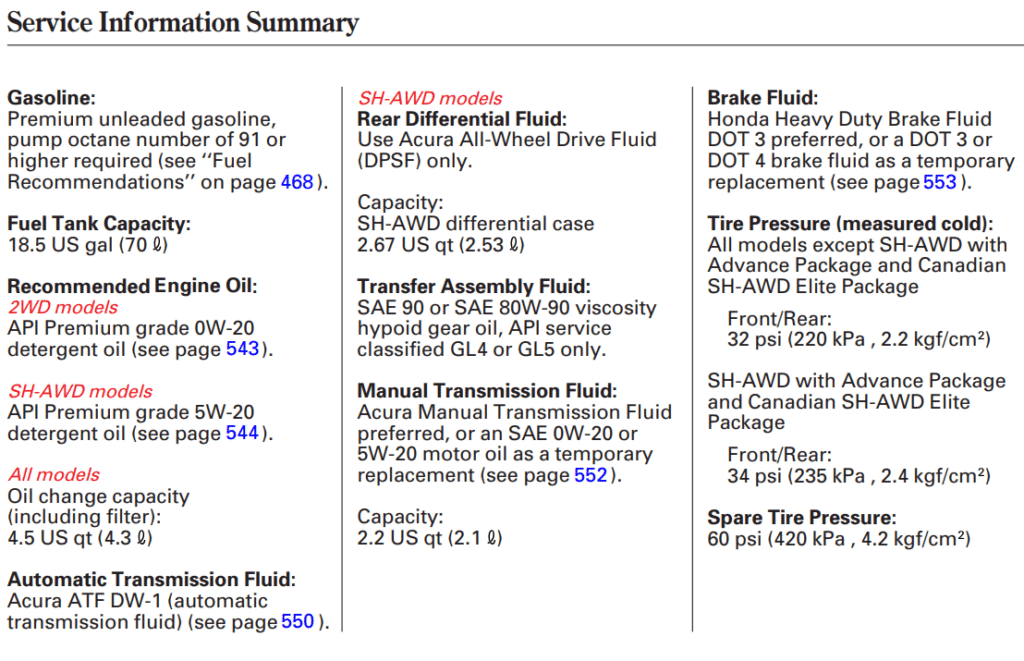The 2013 Acura TL is a luxury sedan that exudes style, performance, and advanced features. Known for its sleek design, refined interior, and engaging driving experience, the Acura TL has garnered a strong following among car enthusiasts. With its powerful engine options and impressive handling capabilities, this vehicle continues to captivate drivers seeking a balance between comfort and exhilaration.
When it comes to maintaining the optimal performance and longevity of any vehicle, including the 2013 Acura TL, using the correct oil type is of utmost importance. The engine oil plays a vital role in lubricating various components, reducing friction, and dissipating heat generated during engine operation. Using the recommended oil type ensures that the engine operates smoothly, improves fuel efficiency, and minimizes wear and tear.
Using the wrong oil viscosity or formulation can lead to potential engine damage, reduced performance, and increased fuel consumption. Understanding the specific oil requirements for your Acura TL is essential to protect your investment and enjoy a seamless driving experience. In the following sections, we will explore the engine specifications of the 2013 Acura TL and delve into the recommended oil types, providing you with expert advice from a seasoned car mechanic.
Understanding the Acura TL’s Engine and Oil Requirements
The 2013 Acura TL offers two engine options: a 3.5-liter V6 engine and a more powerful 3.7-liter V6 engine in the performance-oriented TL SH-AWD model. The 3.5-liter V6 produces 280 horsepower, while the 3.7-liter V6 generates an impressive 305 horsepower. Both engines deliver a smooth, responsive driving experience, combining power and efficiency.
Acura recommends using synthetic blend or full synthetic oil with a viscosity of 5W-20 for the SH-AWD models 2013 and 0W-20 oil for the 2WD models. Viscosity refers to the oil’s thickness and its ability to flow at different temperatures. The “5W” indicates the oil’s viscosity at colder temperatures, while the “20” represents its viscosity at higher temperatures. This oil viscosity range ensures proper lubrication and protection for the engine under varying operating conditions.

Choosing the appropriate oil for your 2013 Acura TL is crucial for several reasons. Firstly, using the recommended oil viscosity ensures optimal lubrication, which reduces friction and wear on engine components. It also helps maintain consistent engine performance and fuel efficiency.
Secondly, using the recommended oil type is essential for protecting the engine from potential damage. Modern engines, like those in the Acura TL, have intricate components that rely on proper lubrication to function optimally. Using the wrong oil viscosity can lead to inadequate lubrication, resulting in increased friction, heat buildup, and potential engine damage.
Lastly, adhering to the recommended oil type is essential for warranty compliance. Using the incorrect oil viscosity or formulation could potentially void the warranty coverage on engine-related issues. To ensure the longevity and reliability of your Acura TL, it’s vital to follow the manufacturer’s guidelines when selecting the appropriate oil.
By understanding the engine specifications, recommended oil viscosity, and the significance of choosing the right oil, Acura TL owners can make informed decisions about their vehicle’s maintenance, ensuring optimal performance and durability. In the next section, we will explore the specific oil recommendations provided by Acura for the 2013 TL model.
What Kind Of Oil Does A 2013 Acura TL Take?
Acura, as the manufacturer of the 2013 Acura TL, provides specific recommendations for oil types to ensure optimal performance and longevity. For 2WD models, Acura recommends using API Premium grade 0W-20 detergent oil. For SH-AWD models, Acura recommends API Premium grade 5W-20 detergent oil. It is important to note that these recommendations supersede any previous guidelines and should be followed for the best results.
While Acura does not endorse specific oil brands, they recommend using oils that meet the API Premium grade specifications outlined above. Numerous reputable oil brands offer oils that meet these requirements, including but not limited to Castrol, Mobil 1, Valvoline, Pennzoil, and Quaker State. It is advisable to select oils from well-known brands that provide high-quality synthetic or synthetic blend options.
Using the OEM-recommended oil for your Acura TL offers several advantages. These oils are formulated to meet the specific requirements of the engine, providing optimal lubrication, protection against wear, and enhanced performance. They are designed to perform well under various temperatures and driving conditions, ensuring the engine operates smoothly and efficiently.
Additionally, using the recommended oil type helps maintain warranty compliance, as Acura validates the performance and durability of their vehicles based on these specifications. By adhering to the manufacturer’s guidelines, you ensure that your vehicle remains covered under warranty for engine-related issues.
Synthetic vs. Conventional Oil: Making an Informed Choice
Synthetic oil and conventional oil differ in their composition and production methods. Synthetic oil is artificially engineered and undergoes a refining process to create a more consistent and uniform molecular structure. On the other hand, conventional oil is derived from crude oil and goes through a less complex refining process.
Pros And Cons Of Each Oil Type For The Acura Tl
- Synthetic Oil:
Pros:- Enhanced engine protection: Synthetic oil offers better lubrication and reduces friction, which helps minimize engine wear and tear.Improved performance: Synthetic oil’s consistent molecular structure and resistance to breakdown allow the engine to operate efficiently, resulting in improved horsepower and fuel economy.Better cold-weather performance: Synthetic oil flows more easily at low temperatures, ensuring easier engine startups in cold climates.Extended oil change intervals: Synthetic oil typically lasts longer between oil changes, reducing maintenance frequency.
- Higher cost: Synthetic oil is generally more expensive than conventional oil, although the price difference has decreased over time.
- Potential leaks: In some cases, switching from conventional oil to synthetic oil in older vehicles with worn seals may lead to oil leaks.
- Conventional Oil:
Pros:- Lower cost: Conventional oil is typically more affordable compared to synthetic oil.Suitable for older engines: Conventional oil can work well in older vehicles with looser tolerances and seals.
- Reduced engine protection: Conventional oil may not provide the same level of engine protection and performance as synthetic oil, especially in extreme operating conditions.
- More frequent oil changes: Conventional oil requires more frequent changes due to its shorter lifespan compared to synthetic oil.
- Limited cold-weather performance: Conventional oil may thicken in colder temperatures, making it harder for the engine to start.
3. Synthetic Blends As A Viable Alternative:
Synthetic blends, also known as semi-synthetic oils, offer a middle ground between synthetic and conventional oil. They combine synthetic and conventional oil components to provide improved engine protection and performance at a more affordable price than full synthetic oil. Synthetic blends can be a viable option for Acura TL owners who want some of the benefits of synthetic oil without the higher cost.
When choosing between synthetic and conventional oil for your Acura TL, consider factors such as your driving conditions, climate, and budget. Synthetic oil is generally recommended for its superior engine protection and performance, especially in newer vehicles. However, if you have an older vehicle or are on a tighter budget, conventional oil or a synthetic blend may still provide adequate lubrication and protection.
Maintaining Optimal Oil Levels and Regular Oil Changes
Checking and maintaining proper oil levels in your Acura TL is crucial for the health and longevity of the engine. Adequate oil levels ensure optimal lubrication of engine components, reducing friction and preventing excessive wear. Insufficient oil levels can lead to increased friction, overheating, and potential engine damage. Regularly checking the oil level is a simple yet effective way to ensure your engine is properly lubricated and protected.
Recommended Oil Change Intervals For The Acura Tl
Acura recommends following specific oil change intervals for the 2013 Acura TL, which can vary based on factors such as driving conditions and oil type. As a general guideline, it is advisable to change the oil every 7,500 to 10,000 miles or every 6 to 12 months, whichever comes first. However, it’s important to consult your vehicle’s owner’s manual for the manufacturer’s recommended oil change intervals specific to your Acura TL.
Diy Oil Change Tips And Considerations
Performing a DIY oil change can save you time and money while allowing you to maintain your Acura TL’s engine. Here are some tips and considerations:
- Gather the necessary tools and materials: You’ll need a wrench or socket set, oil filter wrench, new oil filter, drain pan, funnel, and the appropriate amount and type of oil as recommended by Acura.
- Safety first: Ensure your vehicle is parked on a level surface and the engine is cool before starting the oil change process. It’s also advisable to wear gloves and have safety glasses on hand.
- Locate the oil drain plug and oil filter: Refer to your owner’s manual to locate the oil drain plug and oil filter. Position the drain pan beneath the drain plug to catch the old oil.
- Drain the old oil: Use the wrench to loosen and remove the drain plug. Allow the old oil to completely drain into the pan. Once drained, replace the drain plug and tighten it securely.
- Replace the oil filter: Use the oil filter wrench to remove the old oil filter. Apply a thin film of new oil to the rubber gasket of the new oil filter. Install the new oil filter and tighten it according to the manufacturer’s instructions.
- Refill with fresh oil: Remove the oil cap and use a funnel to pour the recommended amount and type of oil into the engine. Check the oil level using the dipstick and add more oil if necessary. Replace the oil cap securely.
- Properly dispose of the used oil: Used oil is considered hazardous waste, so it’s important to dispose of it responsibly. Many auto parts stores and service centers accept used oil for recycling.
While DIY oil changes can be rewarding, if you’re not comfortable or familiar with the process, it’s always recommended to seek professional assistance from a trusted mechanic or service center.
By regularly checking and maintaining proper oil levels and adhering to the manufacturer’s recommended oil change intervals, you can keep your Acura TL engine running smoothly and efficiently.
How Much Oil Does A 2013 Acura TL Take?
The 2013 Acura TL typically requires around 4.5 to 4.6 quarts (or approximately 4.3 liters) of oil for an oil change. However, it’s important to refer to your vehicle’s owner’s manual or consult with a trusted mechanic to get the most accurate and specific information regarding the oil capacity for your particular Acura TL model.
The exact amount may vary depending on factors such as the engine type, oil filter size, and any modifications or variations in the vehicle’s specifications.
Expert Advice
To provide valuable insights into the ideal oil type for the 2013 Acura TL and tips for maintaining the engine’s health, we had the opportunity to interview Richard Smith, a seasoned car mechanic with over 20 years of experience specializing in Acura vehicles.
Q: What is your recommendation for the ideal oil type for the 2013 Acura TL?
Richard: For the 2013 Acura TL, I recommend following Acura’s official recommendations of using API Premium grade 0W-20 detergent oil for 2WD models and API Premium grade 5W-20 detergent oil for SH-AWD models. These oil types are specifically formulated to meet the engine’s requirements and provide optimal protection and performance.
Q: Are there any specific considerations or tips when it comes to maintaining the engine’s health?
Richard: Absolutely. Here are a few key tips for maintaining the engine’s health and prolonging its lifespan:
- Stick to the recommended oil change intervals: Regularly changing the oil at the specified intervals ensures that the engine is adequately lubricated and protected.
- Use high-quality filters: Along with using the right oil, it’s crucial to use high-quality oil filters that effectively remove contaminants and ensure clean oil circulation.
- Check the oil level regularly: Get into the habit of checking the oil level using the dipstick to ensure it’s within the recommended range. Low oil levels can lead to engine damage, so it’s important to address any leaks or consumption issues promptly.
- Monitor for warning signs: Keep an eye out for warning signs such as engine noise, oil leaks, or abnormal oil consumption. These could indicate underlying issues that require attention from a professional.
- Follow proper warm-up and cool-down procedures: Allow the engine to warm up before driving aggressively, and give it a few minutes to cool down after a long drive. This helps maintain proper lubrication and prevents thermal stress on engine components.
Q: Any additional advice for Acura TL owners?
Richard: Yes, I would highly recommend following the manufacturer’s guidelines outlined in the owner’s manual for routine maintenance tasks such as fluid changes, filter replacements, and inspections. Additionally, if you have any concerns or questions about your Acura TL’s engine health, it’s always wise to consult a qualified mechanic who has experience working with Acura vehicles.
Following these tips and guidelines will go a long way in ensuring the optimal performance, longevity, and reliability of your 2013 Acura TL’s engine.


